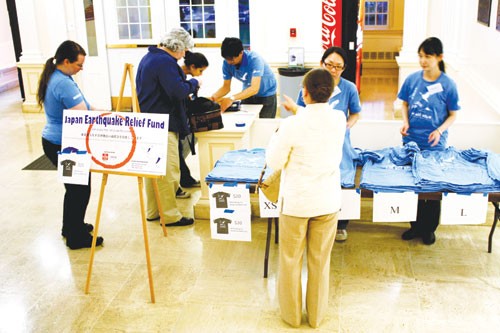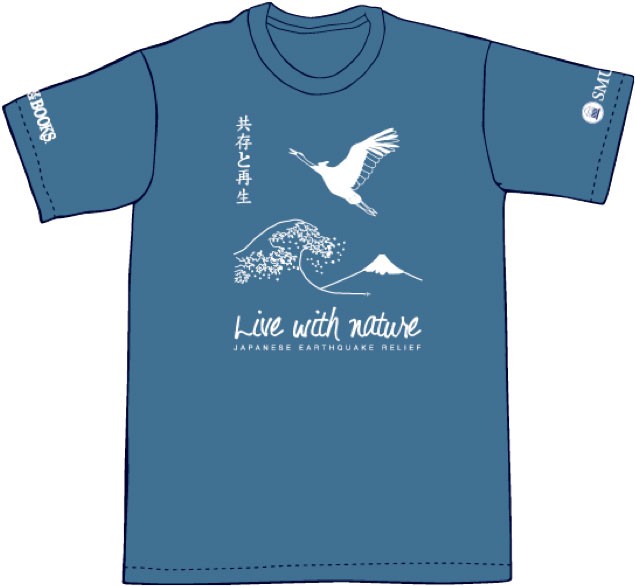
Members of JASMU have sold 397 T-shirts in an effort to raise funds for those affected by the earthquake in Japan. (Photo courtesy of Meghan Sikkel )
The newly formed Japanese Association at SMU has raised over $9,000 in relief efforts after the deadly earthquake and tsunami struck Japan last month.
The evening of March 11, Isaac Saito received an email from his mother living in Tochigi, Japan, 100 miles from the epicenter of the 8.9-magnitude earthquake that hit the island nation earlier that day.
In the email, his mother said she thought she was going to die.
“Honestly, I’m not a person who is driven by an emergency and acts for someone else who is in trouble,” Saito said. “But I’ve concluded that my motivation this time came from concern for the country where I was born and raised and for my loved ones who thought they were going to die.”
After the most powerful earthquake in Japan’s recorded history struck his home country, Saito, a graduate student at SMU, contacted SMU’s six Japanese international students to start a relief group in response to the disaster.
Together, he and Yuri Kimura founded the Japanese Association at SMU (JASMU), the university’s first organization created specifically for Japanese students.
Co-founder Kimura, a Ph.D. candidate in the Huffington Department of Earth Sciences in Dedman College, was talking to her mother on Skype when the earthquake hit near her parents’ home in Tokyo.
“She told me that it was the biggest earthquake she had ever experienced,” Kimura said.
Kimura stayed up all night contacting her family and friends until she knew everyone was OK.
“Because I grew up in Japan, earthquakes are a part of my life experience,” Kimura said. “But I never realized that one earthquake could trigger such disasters.”
Six years ago, something similar happened to SMU graduate student and JASMU member Noritoshi Hiyama. Hiyama survived a large earthquake in Kobe, Japan that killed over 6,000 people.
“It was so terrible that I optimistically thought Japan would never experience a worse one during the remainder of my life,” Hiyama said.
Japan’s recent earthquake proved him to be wrong, but it was the tsunami, not the earthquake, that surprised Hiyama the most.
“Although a lot of small earthquakes occur in Japan on a daily or weekly basis, most Japanese people, including me, have never experienced a tsunami,” Hiyama said. “I could not believe it was happening in Japan.”
Hiyama joined Saito and Kimura in their relief efforts, becoming the third board member of JASMU. The other two members of the organization are Emi Kodama and Kiyoko Hiyama.
Since it was formed, JASMU sold 397 T-shirts designed by Kimura with the concept, “Live with nature and recover from disaster.”
The $20 T-shirt displays images of Mount Fuji and a crane as symbols of Japan and a large wave representing the earthquake and tsunami. T-shirts will be sold in Heroy Science Hall room 321 from now until the end of the semester.
The organization also raised funds by hosting a charity talk featuring SMU professionals who spoke about what happened in Japan the day of the earthquake.
With the entrance fee of the charity talk and the T-shirt sales combined, JASMU has raised a total of $9,117.46 thus far. All of the money raised by the organization will go to the American Red Cross.
The JASMU members admitted they were surprised by the amount of support they received from the SMU and Dallas communities.
“To be honest, I couldn’t imagine this much of a warm and generous response in so many ways from the students and faculty,” Saito said.
Although the group has already had a great deal of fundraising success, JASMU does not plan to slow its relief efforts anytime soon.
“I would like to raise $10,000 in total by the end of this semester,” Kimura said.
While they have seen a large amount of concern and aid for Japan in the United States, the JASMU members emphasized that in order for the country to recover from the disaster, our nation’s support cannot dwindle.
“What will be required in this situation is a continuing effort,” Saito said. “The impact is too huge for a single country to recover on its own.”









